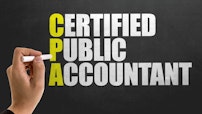The 5 Best Accounting Certifications in the US
Once you have decided on a career in accounting or finance, you might be wondering whether to diversify your skills or identify a niche to further your studies.
You may also find yourself questioning whether to explore an MBA, research what professional certifications are available to you or whether in-house training could be an option.
There are multiple career paths open for qualified, talented accounts and finance professionals.
If you are considering exploring the option of studying for a license or professional certification, you may find the number of different accreditations currently available to be daunting.
However, each one provides study and testing in different competencies and will lead to varying opportunities within the financial and accountancy sphere.
Selecting the right certification from the many on offer will require you to make some decisions about your future goals and assess your technical skills.
There are significant benefits to gaining accounting certification relevant to the field you wish to work in.
Having a recognized accounting certification can:
- Increase job prospects
- Lead to higher salaries or increased bonuses
- Make you more employable in a competitive market
- Put you at a higher chance of getting a promotion once you are settled into a role
By taking the time to learn and investing money in furthering your education, you also demonstrate your commitment to your chosen field.
This kind of dedication will reflect well on you when hiring managers come to view your resume.
What Types of Accounting Certification Are There in the US?
There are various accounting certifications available in the US that allow accounting and financial professionals to either diversify into or focus on, particular niches including taxation, fraud investigation, business analysis, financial analysis, accounts management and corporate accounting.
Among the most popular are:
- Certified Public Accountant (CPA)
- Enrolled Agent (EA)
- Certified Management Accountant (CMA)
- Chartered Financial Analyst (CFA)
- Certified Fraud Examiner (CFE)
- Certified Internal Auditor (CIA)
- Certified Information Systems Auditor (CISA)
- Chartered Global Management Accountant (CGMA)
Each license or credential offers different benefits to your career, and some professionals choose to become accredited for more than one to solidify their status as an expert in their related fields.
Studying for these certifications requires time, commitment, as well as a financial investment of varying degrees.
Which Are the Best Accounting Certifications?
Your skills and experience will dictate the license or certification that is most attractive and useful to you, areas of interest, plans for the future, as well as your personal and economic circumstances.
Here is an in-depth look at some of the most popular certifications available in the US:
Certified Public Accountant (CPA)
Estimated cost: $3,000
The CPA is the most widely recognized certification.
CPAs are highly sought after, making this certification among the most useful and well respected by industry professionals.
If you are unsure what niche you would like to go into or want to practice generalized accounting, becoming a CPA is a sensible choice.
To become a CPA, you are required to pass all four parts of the AICPA Uniform CPA exam and commit to continuing your professional development.
There are also other education and eligibility requirements, which vary state by state.
Usually, at least one year of accounting experience is required.
The exam comprises a four-section, 16-hour assessment and a minimum score of 75 is required on each. Periodically, CPAs are also required to sit ethics examinations.
With the CPA certification, successful candidates are in a unique position to diversify into many different careers within accounting from non-profit right up to corporate accounting, where experienced professionals can command six figure salaries.
Chartered Financial Analyst (CFA)
Estimated cost: $2,000+
You can become a financial analyst without this certification; however, gaining the additional designation from the CFA institute will improve a candidate's prospects for professional advancement.
To become a CFA charter holder, you will need to pass the CFA program, complete work experience, submit reference letters and make your application to become a charter holder.
The CFA program is made up of three exams, each relating to three separate areas of learning that must be completed.
All three exams must achieve a pass in order to progress.
Candidates must also satisfy work experience requirements (this can be obtained before, during or after participation in the CFA program) related directly to investment-decision making.
Two or three professional references are also required.
Referees must be able to provide commentary on the candidate's work experience and professional character.
Once you have satisfied all of the eligibility criteria, you can apply to become a member of the CFA Institute.
Once approved, you will have successfully gained the CFA charter.

Enrolled Agent
Estimated cost: $700
Enrolled agents represent taxpayers (both businesses and individuals) before the IRS.
They are federally licensed tax practitioners who can advise in areas such as:
- Collections
- Audits
- Tax appeals
This is a job that is more client-focused and does not require a college degree.
EA's are required to either pass an exam or prove that they have the minimum experience as an IRS employee (at least five years and demonstrate in-depth knowledge of the tax code).
The role also requires a background check.
The EA credential is the highest tax professional credential that the IRS currently accepts.
The three-part exam is taken over two days and lasts eight hours in total.
The test covers specific areas, including personal tax issues, business taxes, procedural issues, and how to represent clients.
EAs also have to commit to at least 72 hours of continuing education courses every three years.
This accreditation is ideal for those who wish to specialize in taxation, are highly organized and sure to be current with their filing and capable of passing a tax compliance check and are keen to work in a client-facing role.
It is also one of the few that can be obtained using on-the-job training and does not require a bachelor's or MBA.
Certified Internal Auditor (CIA)
Estimated cost: $1,500
Unlike the CPA credential, the CIA is a globally recognized designation. Furthermore, it is the only internal audit certification that is accepted worldwide.
There are over 170,000 CIAs in more than 170 countries, and the CIA exam is available in several languages, including English, Spanish, Traditional Chinese and Arabic.
The exam is in three parts:
- Part One – Essentials of internal auditing
- Part Two – Practise internal auditing
- Part Three – Business knowledge of internal auditing
The multilingual format ensures that it is widely accessible, and the exam has recently been revised to reflect the demands and reality of the role of the internal auditor across the globe, keeping the content fresh and relevant.
The examinations total 6.5 hours of exam time.
This certification is aimed at those who wish to work in compliance and auditing.
Often, those who gain the CIA title will work within larger businesses helping with internal auditing or assisting in a capacity as an independent auditor.
They are there to ensure that companies show full compliance with state and federal laws.
They can also perform risk assessments and examine records and financial statements to either find or rectify problems.
This certification is ideal for anyone who knows that they want to go into auditing and has the capacity to analyze and assess large amounts of data and communicate with businesses on different levels.
The CIA designation is beneficial to anyone who wishes to have a career in auditing and would like the freedom to work internationally.
Certified Management Accountant
Estimated cost: $1,000 to $2,000
The CMA certification is globally recognized aimed at those who desire management or executive positions.
To gain this prestigious title, candidates must pass both parts of the exam, possess a bachelor's or professional accounting certification and have a minimum of two years of practical work experience.
The two-part exam tests for knowledge within two primary competencies:
- Part One – Financial Planning, Performance and Analytics
- Part Two – Strategic Financial Management
The certification is awarded by the Institute of Management Accountants (IMA), and the recommended study time is 150 to 170 hours per part, with three years given to complete both parts.
Only 50% of candidates who take the examinations achieve a pass mark, making it challenging to complete.
Many of the certifications have some commonalities with the CPA credential; however, the CMA route offers something more unique.
It is specifically aimed at those destined for managerial roles, especially within big business.
This credential is not meant for candidates who will need to perform audits, prepare reports or deal with compliance or taxation issues.
However, it would complement those who have already studied these specialisms and wish to further their management careers or progress higher within the corporate world.
It is a well-regarded certification, which is considered to be less intensive than the renowned CPA.
The core subject areas provide less of an in-depth look at financial or account management and focus on turning the theory around data analysis into dialogue.
It is ideal for anyone who prefers managing people over managing accounts.
Final Thoughts
These certifications and accreditations signal to future employers and clients that you commit to your chosen profession, a valuable skillset, relevant experience and an understanding of ethics and compliance.
The best accounting certification for you will depend on your career goals.
Once you can define these, you should be able to choose a course that corresponds to them.
Additional accreditations are an invaluable tool to advance your career within business, particularly in the highly competitive fields of accounting and financial analysis.





